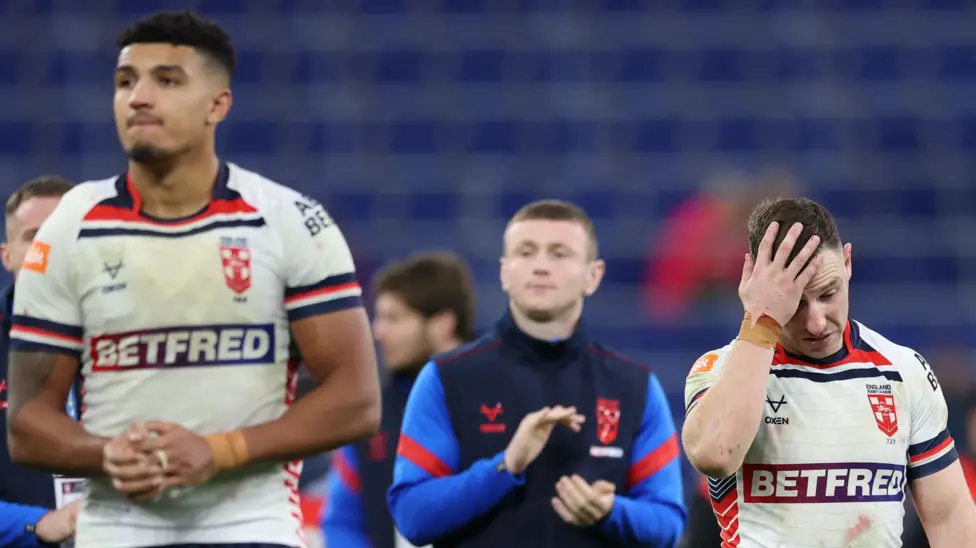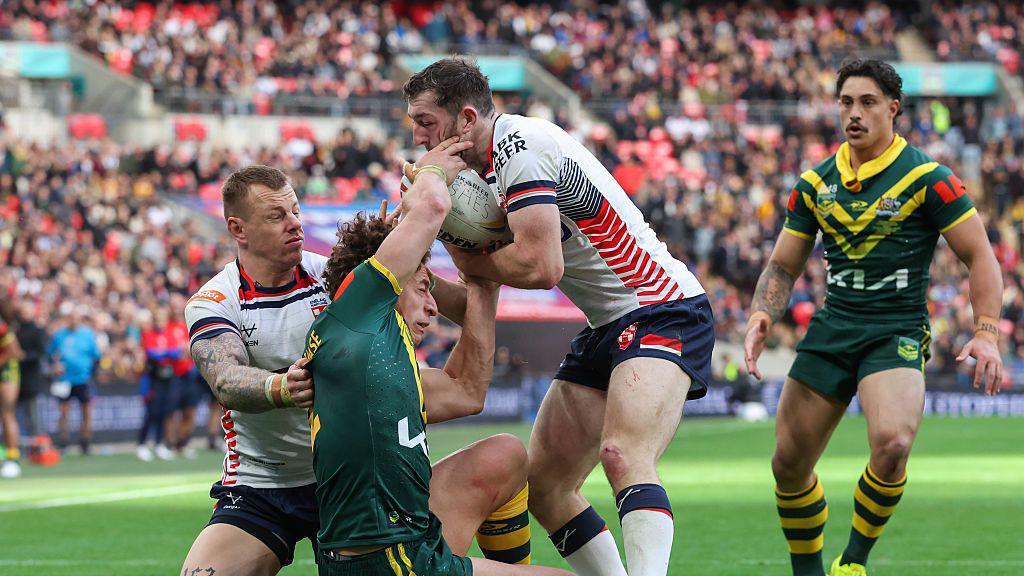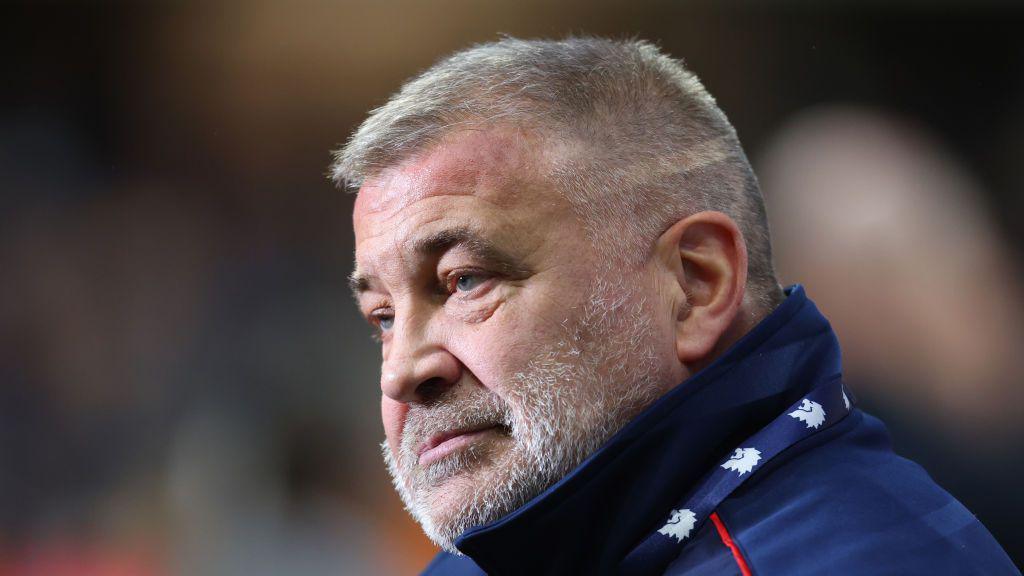
Where Does Ashes Series Defeat Leave England?
England’s Rugby League Ashes Lessons and What Comes Next
The Ashes are supposed to be the great measuring stick of English rugby league—a test of steel, smarts, and spirit against the game’s gold standard. But as Australia sealed the series with a game to spare, England’s players and fans were left with that familiar sinking feeling: so near, yet so far.
For all the frustration of losing the first Rugby League Ashes series in 22 years before the final whistle of the third Test, there’s still a conviction among Shaun Wane’s men that they’re not miles away from the world champions. And to be fair, that belief isn’t entirely misplaced.
In both Tests, England were arguably the better side in the first half—firing forward with aggression, tackling with purpose, and playing with heart. But in each game, when Australia found that next gear early in the second half, England had no answer. It’s become a recurring pattern. The Kangaroos won 26-6 at Wembley, then followed up with a 14-4 victory in Liverpool, a scoreline that flattered the hosts’ effort but not their finishing.
So where does this leave England with the World Cup now less than a year away, and, crucially, to be held in Australia—the very heartland of the sport and the backyard of the reigning champions?
Wane’s England: Effort Without Rhythm
For head coach Shaun Wane, the answer lies in opportunity—or rather, the lack of it.
Wane has long argued that England are held back by the simple fact that they don’t play enough international rugby. Super League’s demanding schedule, with its packed calendar of domestic fixtures and the Challenge Cup commitments, means there’s little room for England to build cohesion.
Super League clubs played three more regular-season games than their NRL counterparts in 2025. That’s a big difference when you factor in travel, rest, and recovery. The result? No mid-season Test, no continuity, and a squad that only gathers sporadically.
“If we want to nail our international calendar, we need to play teams like Australia more on a level playing field,” Wane said this week. It’s a fair point—England can’t expect to challenge the Kangaroos if their preparation time is a fraction of what the Aussies enjoy.
But that reality also raises a worrying prospect: Saturday’s third and final Test at Headingley could be England’s last outing before their World Cup opener next year. And if that’s true, Wane’s team have one last chance to set a tone before they step into enemy territory.
Close But Not Close Enough

England v Australia at Wembley
Critics have been quick to draw comparisons with the England team that reached the 2017 World Cup final—a gritty, disciplined unit that fell agonisingly short in a 6-0 loss to Australia.
Only one player remains from that squad: Kallum Watkins. For him, the narrative that England have gone backwards doesn’t sit right.
“I don’t think so—we’ve been really close,” Watkins told BBC Sport. “We’ve got a good core group of players; it’s about giving them the experience of playing in these games. This Test series has been a platform for that, building up to the World Cup. It’s the small details. We can match them physically—we showed that last week—and we’ve made chances; we just have to execute them.”
That word—execution—has haunted England across both Tests. They’ve created opportunities through power and pace, but too often, the final pass has gone astray or the kick has been mistimed. Australia, by contrast, have been ruthlessly efficient. Every half-chance has felt like a potential try.
Proof of Progress or False Hope?
St Helens prop Matty Lees is another who refuses to dwell on the negatives. For him, the bigger picture still looks encouraging.
“At club level, we beat Penrith in the World Club Challenge [in 2023],” he said. “It’s closer than people think. But we need to get closer internationally. We were going the right way against Tonga and Samoa, and we’ve got better each game against Australia.”
Lees points out something important: the trend is upward. England have shown steady improvement since their World Cup semi-final heartbreak in 2022. They’ve put away Tonga and Samoa in clean-sweep series and look physically ready for the demands of Test rugby.
The question now is whether that progress can translate into big-game victories against the best of the best.
A Tactical Tangle
If effort and fitness aren’t the problem, perhaps tactics are. England’s attack has looked blunt, predictable, and—at times—confused.
Lees was candid about the first Test: “It didn’t lack effort, but lacked clarity in our roles. We fixed that in the second match. We were a lot happier and that showed. We were competing. Hopefully we can build on that.”
At Wembley, England were often outnumbered in midfield, struggling to break the line and relying too heavily on high kicks to force errors. In Liverpool, they were better organised and far more physical, but they still couldn’t find a cutting edge.
Ultimately, both games were decided by flashes of individual brilliance—Reece Walsh’s electric runs in London and Nathan Cleary’s tactical masterclass on Merseyside. That’s the difference between world champions and hopeful challengers: the ability to turn half-chances into match-winners.
Players Back Their Coach
As always in defeat, the coach comes under fire. Shaun Wane’s pragmatic, defence-first style has divided opinion. Critics say it’s outdated; supporters say it’s what keeps England competitive.
The return of veterans like Watkins and Joe Burgess has also raised eyebrows. To some, it smacks of a lack of fresh blood; to others, it’s simply a reflection of the limited international experience available.
But inside the camp, the message is clear: the players are behind their boss.
“I love Shaun Wane—he’s passionate about his country, and I can relate to that,” said hooker Jez Litten. “To come into camp and represent who we are as a nation is unreal. The way he gets the boys motivated is unreal. If you look at someone who would do anything for his country, that’s someone I want to play under.”
For Litten, and many others, Wane embodies the pride and passion they want to see in the shirt. That sense of identity—of playing for more than just a win—still runs deep.
The Road to the World Cup
While the final Ashes Test may technically be a dead rubber, it’s anything but meaningless for England. It’s a chance to send a message—to themselves as much as to Australia—that they’re closing the gap.
The Kangaroos have named another strong side, with captain Isaah Yeo returning to the fold. For England, it’s a test of resilience and response. Another defeat would invite more scrutiny. A win, even a scrappy one, could change the narrative heading into next year.
“We don’t want an Australian whitewash,” said Lees. “That will hopefully put us in a good place for the World Cup. It has definitely been a step up.”
The margins remain slim. The belief remains strong. But if England truly want to lift the World Cup in Australia next year, belief alone won’t be enough. They’ll need sharper execution, smarter tactics, and more time together.
For now, though, the Ashes have offered a reminder: England aren’t broken—they’re just unfinished. And in rugby league’s fiercest rivalry, that’s not a bad place to start.



























There are no comments yet. Be the first to comment!